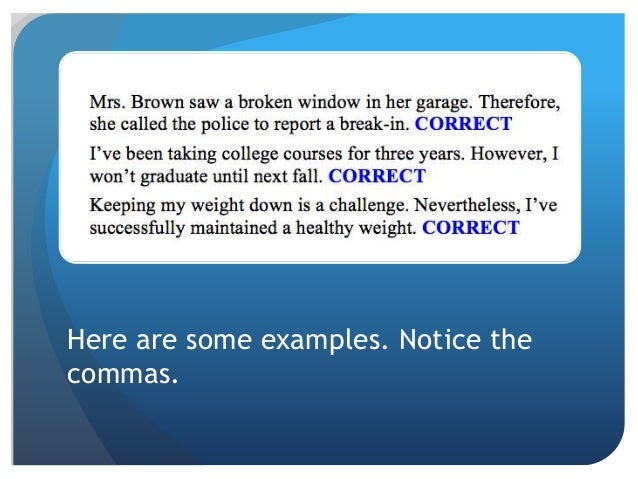Therefore is a conjunctive adverb—the same type of adverb as "however," "finally," or "then." If you want to know how to use it correctly in a sentence, you need to know a couple of things about what conjunctions do and how they influence the punctuation used with them. Sometimes, you can have a sentence made up of two independent clauses—two parts of a sentence that can stand independently from each other as complete sentences. Independent clauses are usually joined together by a conjunction, and we call that kind of conjunction a coordinating conjunction. "Therefore" is a conjunctive adverb that you can use as a transition word in sentences and paragraphs.
It shows cause and effect between independent clauses, so it cannot be used to start a paragraph or included as part of a standalone sentence. If you would like to use "therefore" in your writing, there are several things to remember to ensure that you are using it correctly. There are also some common misuses of "therefore" that you will want to avoid. Hence is a conjunctive adverb that facilitates a flawless transition between sentences.
Hence is often used to refer to something in the future or conditional tenses. Hence often means as a consequence or for this reason. Since hence is a conjunctive adjective, it cannot join two independent clauses together.
It can only help smooth transition between sentences. Therefore, it can be used preceded by a semicolon or period as shown in the following first two examples. Since "hence" is a conjunctive adverb, its main role in sentences is to help link two ideas together, but it cannot directly link two clauses.
This means that "hence" is oftentimes paired with the coordinating conjunction "and" at the second part of the sentence. All of these examples create comma splices because there are complete sentences to the left and the right of the conjunctive adverbs however, therefore, and moreover. The commas after "growth," "hunger," and "poet" create the comma splices. Here is the correct way to punctuate these sentences. A common problem writers face is the incorrect usage of conjunctive adverbs. Many times it is because they confuse them with coordinating conjunctions.
In fact, when compared to words most similar to it in meaning and usage – "therefore" and "thus" – it's the most formal. "Hence", however, is more commonly used in written words than in speech. In everyday conversation, the word "so" invariably substitutes "hence". The word "hence" is an adverb – just like "therefore" and "thus". Contrary to what some might believe, the term is not a conjunction.
However, "hence" could be termed a "conjunctive adverb" as it is used to indicate a causal relationship between a couple of clauses in a statement. When a coordinating conjunction separates two independent clauses, the conjunction is usually preceded by a comma. A conjunctive adverb that separates independent clauses can be preceded by a semicolon.
Use a semicolon, not a comma, to join two independent clauses separated by a conjunctive adverb . The conjunctive adverbs include accordingly, consequently, hence, however, moreover, otherwise, therefore, and thus. Hence and thus are two conjunctive adverbs, and they are mostly used in written language to make smoother, the transition between ideas and sentences.
Though these words are used interchangeably in most cases, there is a slight difference between hence and thus. The main difference between hence and thus is that hence is generally used to refer to the future while thus is often used to refer to the past. It is a formal word and is to be used sparingly.
It is best reserved for academic texts or writings of a serious nature. You would not use it in an essay about your holiday at the seaside, for example. 'Hence' is an adverb, and in its simplest form means 'from this time' or 'from this place'. In its most archaic form, 'hence' means 'depart' and can be used as a euphemism, meaning 'to die'. In some of Shakespeare's texts, he appears to use it as a verb. In its most common modern-day form, 'hence' is used as a conjunctive adverb in which case the meaning is 'therefore', 'for this reason' or 'from this source'.
To use "therefore" in a sentence, place it in a cause and effect statement to show the relationship between 2 ideas. For example, write "John studied hard for the exam. Therefore, he got an A+" to show that John got an A+ because he studied hard. However, "hence" cannot do one thing – merge two independent clauses.
"Hence" is an adverb that helps transition between two ideas, or it demonstrates how the two are related. Because "hence" is not a conjunction, it can be immediately preceded by "and". Generally, two conjunctions do not appear successively in a sentence. An adverb is a word that describes or modifies a verb/action word. It gives the reader more information about how or in what way an action is being performed. Conjunctive adverbs are connecting words that join together two sentences, two parts of sentences, or two ideas in some kind of relationship.
But conjunctive adverbs can do some other things conjunctions do as well. They can also, therefore, be used to interrupt it. In those cases, use commas to set off the conjunctive adverb. To properly use the word "hence" in a sentence, make sure you are not interpreting it for a conjunction or coordinating conjunction.
Because doing so will result in you using commas around it incorrectly. "Hence" can have parenthetical commas, a semi-colon, or even a conjunction before it. Most of the time, problems occur when the writer uses a conjunctive adverb in the middle of a sentence when a coordinating conjunction is actually needed. But remember that conjunctive adverbs can be used in any part of a sentence. Thus is a conjunctive adverb that is used to demonstrate a logical connection between the sentences.
In this sense, it is synonymous to consequently or therefore. Thus is generally used to indicate the past or to indicate a conclusion to a past event. Thus cannot combine two main clauses in a sentence as it is a conjunctive adverb. Therefore, thus should be written in the following ways. "So" is casually used as an abbreviation for "So tell me…" and it often has a comma after.
When one of the coordinating conjunctions is used to join two complete thoughts, a comma is placed before the coordinating conjunction. If there are no two independent clauses, comma is not used. Keep reading to learn in-depth the meaning of the adverb "hence", how it compares to other words closer to it in meaning and usage, and lots more. The second thing to know is the word's part of speech, or the job it does in a sentence.
This is a little confusing for 'hence,' as it is part of a group of words known as conjunctive adverbs. This means they have properties of both adverbs, which modify verbs, adjectives, and other adverbs, and conjunctions, which join parts of a sentence together. There are many discourse markers that express different relationships between ideas.
The most common types of relationship between ideas, and the sentence connectors that are most often used to express these relationships, are given in the table below. The discourse markers in the table are generally used at the start of a phrase or clause. Sentence connectors do not always begin a completely new sentence; they may be separated from the previous idea with a semi-colon.
Discourse markers (words like 'however', 'although' and 'Nevertheless') are referred to more commonly as 'linking words' and 'linking phrases', or 'sentence connectors'. They may be described as the 'glue' that binds together a piece of writing, making the different parts of the text 'stick together'. They are used less frequently in speech, unless the speech is very formal. Don't use "therefore" in place of a coordinating conjunction in most cases. Coordinating conjunctions include the words for, and, nor, but, or, yet, and so.
Each of these terms has a specific meaning and they are not interchangeable with each other or with "therefore." Always check the meaning of a word or phrase before you use it in a sentence. As you can see, therefore and therefor don't mean the same thing. They're also used in a different way—the longer word is, as we mentioned, very often used as a conjunctive adverb; the shorter word isn't. If that's not enough of a difference for you, remember that you can always try substituting synonyms to see which one should have a place in the sentence you're writing. Use a semicolon to join two related independent clauses in place of a comma and a coordinating conjunction .
Make sure when you use the semicolon that the connection between the two independent clauses is clear without the coordinating conjunction. The main difference between Since and Hence is the grammar form, meaning and usage in a sentence. "Since" is used to explain something that is happening from the past but "Hence" is used for describing some action as a result of something happened in the past and connects to the future. The semicolon is actually a very appropriate choice here.
Its role is to separate two clauses that have a tight logical coupling. The form 'statement;consequence' is a great example of when a semicolon is a good choice. That said, many people are unfamiliar with the semicolon and, as a result, it can add an air of formality to your writing, simply because you happen to know what you're doing when it comes to punctuation. "Hence" is quite a tricky word to get right, thanks to the number of things it could mean across varied sentences. A lot of the confusion surrounding the word is also due to its "archaic" nature, which has caused its usage in writing to dwindle over a period. In everyday speech, "hence" is pretty much non-existent.
A synonym is simply a word that means the same as the given word. It comes from the Greek "syn" and "onym," which mean "together" and "name," respectively. When speaking or writing, one of the best ways to expand your vocabulary and to avoid using the same words repeatedly is to use a thesaurus to find synonyms . A thesaurus is a general phrase that describes a type of dictionary that provides a list of words that have the same or similar meaning as the word referenced. For example, if you were to look up the word "beautiful," you might get a listing of more than thirty words that have similar meanings. There are many forms of a thesaurus from Roget's Thesaurus, authored by Peter Mark Roget and published in 1852, to online materials available from companies that specialize in educational resources.
Place a semicolon (;) before "therefore" when separating independent clauses. If you are using "therefore" in the middle of a sentence to separate 2 independent clauses, then you will need to use a semicolon. In other words, if each part of the sentence could stand alone as a sentence, then place a semicolon at the end of the first independent clause, follow that with "therefore," and then place a comma after therefore before continuing the sentence. As discussed above, when "thus" connects two independent clauses, you need a semicolon before "thus." However, when "and thus" connects the two independent clauses, it is like any other sentence in which a conjunction connects two sentences.
The difference between Since and Hence is the grammar form, meaning and usage in a sentence. For the most part, I hate losing hard earned money, hence my aversion to Las Vegas.The undersides of the leaves are silvery with fine hairs, hence the name silverweed. Before moving on to the particular words, it should be noted that "thus", "therefore", and "hence" are all rather formal and much more common in writing than in everyday conversation, where they are almost always substituted by "so". The usage of the semicolon (;) before "hence" not just indicates the formal nature of the word, but it also denotes it isn't a conjunction. Conjunctions usually have a comma or no comma before them, like with "so" in the first sentence.
Contrary to general perception, English grammar books do not dictate the use of commas in writing as a comma denotes a specific intonation. If you are likely to use that particular intonation in speech, use a comma when you write it down. Long story short, it's critical to listen to what you are writing if you are extremely particular about the commas in your sentences. The word "hence" is widely used in English writings. However, if the people who use the word in their texts and scripts were asked to define or describe the word, they would invariably stutter. Not to mention, these are people likely to use the word in their sentences incorrectly.
Separate independent clauses using "therefore." You can use "therefore" in the middle of a sentence that includes 2 independent clauses, but not a sentence that contains dependent clauses. An independent clause can stand alone as a sentence, or you can separate independent clauses using a semicolon. With the Premium version, you can create word lists and share them with your friends, access all games and quizzes and enjoy the site with NO ADS.
Receive the full list of more than 1,000 psychometric words and unlock all learning games, such as grammar, pronunciation, reading comprehension, spelling and custom word lists. Because the adverb therefore often plays the role of a conjunction, it's sometimes called a conjunctive adverb. The phrase "hence why" is grammatically inappropriate. "Hence" simply means "from now on or going forward". It could also be used to mean "as a result" or "for this reason". Hence, you can't deploy "why" alongside the word "hence".
The word "Since" can be used as an adverb, preposition or a conjunction. The meaning of the word "Since" commonly refers to the time period between two circumstances. Adverbs are words that qualify and modify a verb with respect to time, place, frequency, manner, situation, etc.
Prepositions are those that ascertain a relation to another part of the sentence. Conjunction takes part and comes into use in connecting two independent clauses of a sentence. You can start a sentence with "hence" when you're using it synonymously with "therefore." We can only use it at the start when it directly links to the previous sentence. Without a sentence prior, "hence" will make no sense at any point in your writing.






















No comments:
Post a Comment
Note: Only a member of this blog may post a comment.